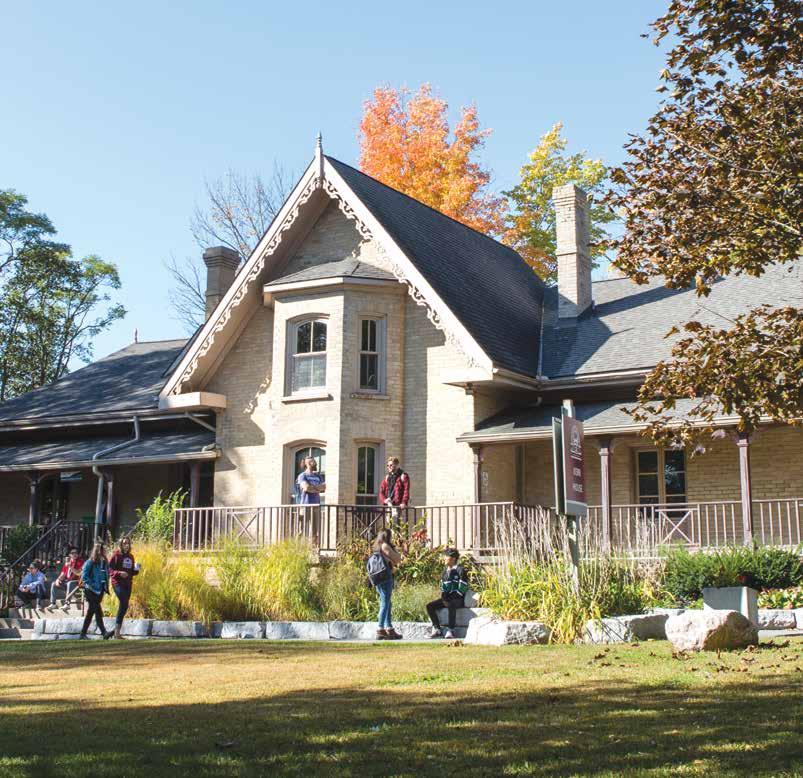
4 minute read
Spotlight on Research
FACULTY
As home to many of the world’s leading researchers, Trent University has countless stories to tell when it comes to research success. Through our outstanding researchers, world-class facilities and prestigious schools of study, Trent is a place where ideas and creativity connect and intersect with industry, non-profits, communities and real-world solutions. Read more about some of the top faculty, student and alumni researchers who are making headlines.
FACULTY RESEARCH SPOTLIGHT Trent Researcher Making Waves as Canada Research Chair in Global Change of Freshwater Ecosystems

Over nearly two decades in Trent’s Biology department, Dr. Marguerite (Maggie) Xenopoulos has gained a reputation as a global leader in the field of freshwater ecosystems, bolstered by her recent appointment as Tier I Canada research chair (CRC) in Global Change of Freshwater Ecosystems. “The CRC is a great opportunity for me to expand my program and to continue mentoring the next generation to follow in my footsteps,” says Professor Xenopoulos. “We still have so much work to do to protect waterbodies and their watersheds.” Through new collaborative research projects, many involving students, Prof. Xenopoulos will be investigating how carbon composition affects the health of aquatic ecosystems, including the amount of CO2 that is outgassed from the water.

STUDENT RESEARCH SPOTLIGHT
Instilling a Sense of Belonging for Future B.S.W. Students and Local Communities STUDENT
Now a Bachelor of Social Work (B.S.W.) graduate from Trent Durham GTA, Katherine Chambers has been instrumental in launching an inclusive legacy for future B.S.W. students to build on. The new Sense of Belonging initiative began as Katherine worked as research assistant examining the culture of inclusion on campus with Dr. Marina Morgenshtern, assistant professor of Social Work.
The unique experiential learning placement transformed into a team effort that promotes the importance of inclusion on campus to students, faculty and staff. Moving forward, fourth-year B.S.W. students can participate in the Sense of Belonging placement with Professor Morgenshtern and spearhead accompanying initiatives.
Want to know more about the sector-leading research and innovation taking place at Trent? Visit our new website:
trentu.ca/researchinnovation
#TRENTURESEARCH HIGHLIGHTS

Bold research making a difference in the world. That’s the Trent University way. Read on for a sampling of the latest Trent research news featured at trentu.ca/news.
ALUMNI RESEARCH SPOTLIGHT Modern DNA Research Solves Historic Mystery ALUMNI
A few artifacts, graves and tales of cannibalism—what really happened to the crew of the ill-fated Franklin Expedition? Trent alumnus Dr. Douglas Stenton ’80 is part of a group of researchers, including Trent Anthropology professor Dr. Anne Keenleyside, who are solving this mystery through DNA analysis. The group recently identified the remains of Warrant Officer John Gregory through a DNA sample obtained from one of his direct descendants, the first crew member to be identified. Their findings start a new chapter to the story of the Franklin expedition, and provide descendants with some closure on the fate of their ancestors.

Diana Trepkov
Collaborating on Climate Change Solutions – Trent Joins EaRTH Research Consortium
Trent University is joining four leading postsecondary institutions to fuel sustainable, resilient communities locally and around the world. The Environmental and Related Technologies Hub (EaRTH District) will work with the public and private sectors, as well as Indigenous communities, and leverages the unique expertise and facilities of partner institutions. The Hub will also facilitate shared research facilities, joint interdisciplinary research projects, and collaborations on curriculum, teaching and learning. Learn more at earthdistrict.ca A Return to Indigenous Ways of Knowing: Uncovering Bodwewaadmii Water Knowledge and Practices Chanie Wenjack School for Indigenous Studies Professor Barbara Wall is uncovering and revitalizing Indigenous water knowledges and practices, with her research bringing to light stories from elders, women, youth and two-spirited people, via guided discussions with Bodwewaadmii (in English, Podawadami) people in relocated communities in the United States. Her work allows for a return to ways of knowing and being, covered up by colonization, and is fundamental to amplifying Indigenous voices through scholarship.
A Wild Summer to Remember: Trent Grad Students Investigate Climate Change Impacts in Polar Bear Provincial Park
Whether flying along the Hudson Bay coast by helicopter, setting up wildlife cameras next to fox dens or watching in amazement as a herd of more than 1,000 caribou wandered through their field camp, Trent Environmental & Life Sciences graduate program students, Laura Corrigan and Gillian Muir, had an extraordinary summer conducting research in Polar Bear Provincial Park, Ontario’s largest and most northern park. Alongside adjunct Trent professor, Dr. Glen Brown, a Ministry of Northern Development, Mines, Natural Resources and Forestry research scientist, they investigated how climate change affects permafrost.
Taking Stock of the Impact of the Pandemic on Financial Institutions Like most sectors in society, global banking systems have been impacted by COVID-19. Dr. Yi Liu, School of Business professor at Trent Durham, and his team are examining how the pandemic has changed the practice of banks repurchasing their own shares in the open market, a method used to distribute profits to shareholders. The project is the first to examine the central bank’s policy and lending behaviours and its effectiveness.
Trent Research Boosts Wolf Conservation Efforts New research out of Trent University is helping shape a hotly debated topic: our understanding on the origins of eastern wolves. The research by Biology professors Dr. Paul Wilson and Dr. Linda Rutledge, recently published in Ecology and Evolution, shows that eastern wolves, specifically the eastern timber wolf and red wolf, are likely descended from large wolf-like coyotes who mated with gray wolves during the end of the last Ice Age. This distinct evolutionary history supports species-atrisk consideration of eastern wolves across North America.










